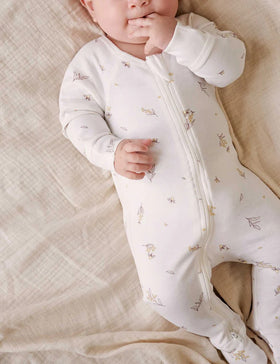
Organic Cotton Clothing for Infants with Eczema
Eczema is an incredibly uncomfortable common medical condition which can affect young infants and children. Eczema is the inflammation of the skin which causes a dry and itchy rash. It usually starts in infancy and childhood, but can also occur in adults. In infants, the face and outer side of the limbs are affected, but during childhood it usually affects the neck and skin folds. In mild eczema, the rash is red, dry and itchy. If the condition worsens, there may be oozing, crusting and bleeding. The itch can be severe enough to interrupt sleep.
Many believe that the high figures of infant sufferers are down to the huge amount of chemicals that we unwittingly use in our daily lives, but the good news is there are things you can do about it. As much as one in five children suffer from eczema, out of which up to 60% develop this skin condition within their first year of life. If your baby is one of the 20 per cent of children who suffer with this debilitating condition, it can be a stressful time for both you and your little one. As such, it might be helpful to know that there are a series of measures you can take to reduce the symptoms and these include buying only organic cotton clothing for babies with eczema.
What is Eczema
Eczema, characterised by itchiness and red, inflamed skin, is the top skin condition seen at the National Skin Centre in Singapore1. The term ‘eczema’ is used interchangeably with ‘dermatitis’ and refers to inflammation of the skin. It is a highly individual condition that varies from person to person and comes in many different forms. In mild cases, the skin is dry, red and itchy; while in more severe cases, the skin may ooze, crust or bleed. The skin may also become infected following breaks in the skin caused by scratching2. Eczema is not contagious, you can’t “catch it” from someone else. The exact cause of eczema is unknown. Researchers do know that children who develop eczema do so because of a combination of genes and environmental triggers. When something outside the body “switches on” the immune system, skin cells don’t behave as they should causing flare ups3.
According to the National Eczema Society, one in five children and one in twelve adults has eczema, which is a genetic condition based on the interaction between a number of genes and environmental factors. Sufferers can also be prone to associated conditions such as asthma, allergies or hay fever. Environmental factors, such as excessive heat or moisture against the skin, as well as the presence of man-made chemicals, which can cause eczema to become worse or trigger a flare up, so, if your baby is a sufferer, there are ways you can help.
Take a look at the products in your home, such as the kind of washing powder you use and make sure it contains no chemicals which may irritate a baby’s sensitive skin. Also, consider the types of food they eat and the clothes they wear, making sure that it’s all as natural as it can possibly be and unlikely to cause allergic reaction.
Why Is Organic Clothing Good For Babies With Eczema
A New York Dermatologist, Dr Gervaise Gerstner, MD has previously commented that “Baby skin is more delicate and sensitive,” and that “Babies have a higher ratio of skin surface area to body volume, which means they absorb chemicals easier. Their skin is actually 30 percent thinner than adults’, too.” Therefore it is this concept about an infant’s skin that leaves baby especially open to absorbing harmful additives and synthetic chemicals that are often sprayed on large-scale commercially produced fabrics that aren’t of organic origin4.
The main reason why organic clothing is so good for a baby’s sensitive skin, is because absolutely no harsh chemicals are used in making the garments, from the cotton picking process in the very beginning, to the moment they hit the shops. This way, you can be reassured in knowing that none of the toxic pesticides, herbicides and other nasty finishing chemicals that are often used in standard cotton making processes will be going anywhere near to your little one’s skin. Not only are organic baby clothing helpful for infants with eczema, a study published in 2014 actually demonstrated a link between the use of ethers, commonly found on mass-produced children’s and baby clothing, to early puberty onset, hormonal disorders, and a host of other issues5. If you think this all sounds pretty scary, you’re not alone. Globally there has been a major trend for fashion houses to go organic over the last decade or so, and on-trend designers are hopping on the health bandwagon eagerly.
Then, there’s the fact that many believe organic cotton clothing is softer against the skin, making it less likely to itch and more absorbent, to draw away moisture which can lead to an eczema flare up. Organic clothing also often comes with flat seams, no neck labels and nickel free poppers, which again can cause irritation.
the baby closet
the baby closet team have lovingly and carefully curated a range of baby clothing and accessories from brands which are dedicated to be as kind as they possibly can to your baby’s skin as well as to the environment. If you have a little one who is suffering from a skin condition such as eczema and you are searching for ways to help alleviate the problem, consider our delightful range and join the baby closet family in our quest to switching to more natural and safe materials.
xOx
the baby closet team
- https://www.eurekalert.org/pub_releases/2019-06/ntu-srt061019.php
- https://www.nsc.com.sg/patients-and-visitors/Health-Library/Conditions-And-Treatments/Pages/Eczema-And-Dermatitis.aspx
- https://nationaleczema.org/eczema/children/
- https://www.rd.com/article/organic-baby-clothes/
- https://ehp.niehs.nih.gov/doi/10.1289/ehp.1307562
#organic cotton clothing
#babies with eczema
#organic baby clothing online


